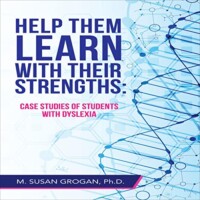Title: Help Them Learn with Their Strengths: Case Studies of Students with Dyslexia
Author: M. Susan Grogan, Ph.D.
Publisher: AuthorHouse
ISBN: 978-1-6655-3619-6
Genre: Education
Pages: 118
Reviewed by: Allison Walker
Pacific Book Review
Our classrooms today bear a striking resemblance to classrooms centuries ago. For a
world that has seen incredible advances in all fields, there is a stunning lack of
innovation from rows of desks facing a blackboard. When neurodivergent students don’t
fit into this box of traditional teaching methods, they inevitably fail. Help Them Learn
with their Strengths: Case Studies of Students with Dyslexia, by M. Susan Grogan,
Ph.D., is an inspiring exploration into the overlooked potential within dyslexic students.
By leveraging students’ other skills and interests to unlock their true educational
abilities, Grogan offers the key to helping dyslexic students succeed in the classroom.
Grogan’s work stands out for her deeply empathetic and informative approach. By
drawing on her professional experience as an educator, Grogan presents compelling
case studies and exhaustive research to demonstrate how dyslexic students can
flourish when stereotypes are set aside and their individual strengths are recognized
and nurtured. Through these real-life narratives and decades of research, Grogan
showcases the remarkable resilience and capabilities of dyslexic students and
encourages a paradigm shift in how we perceive and support these learners. Help
Them Learn with Their Strengths shifts the focus from what dyslexic students cannot do
toward what they excel at. By learning to recognize dyslexia at a younger age and
utilizing a strengths-based approach, educators empower students to engage more
effectively with the learning process, boost their self-esteem, and achieve their potential.
What makes Grogan’s approach so powerful is its benefits to the educational
community at large. When teachers re-imagine traditional teaching methods and
assessments, they help their entire classroom.
Anyone who supports dyslexic students or is challenged by dyslexia themselves will
want to pick up a copy of Help Them Learn with Their Strengths. However, Grogan’s
book opens to a broader audience by tackling the dismal U.S. reading, writing and
spelling scores. When she presents learning psychology and educational strategies in a
clear and relatable way, Grogan makes her book valuable for anyone interested in
inclusive education, neurodiversity in learning, and engaging reading challenged
students. Help Them Learn with Their Strengths strikes a balance between the
academic and the practical, encouraging readers to readily apply the insights gained
from these case studies and conclusions to their own studies, classrooms, or homes.
In this book, each student is unique because each student has a diverse range of
experiences. This nuanced understanding dispels stereotypes, creates an environment
which can be tailored to suit an individual’s needs, and allows for a more personalized
and supportive approach to education. In a world that still frequently underestimates the
potential of dyslexic students, Grogan’s strengths-based approach is a reminder that
instead of bending the student to the classroom, the learning environment should adapt
for the learner. When educators help students learn with their strengths, they pave the
way for a more inclusive, equitable and altogether brighter future.



Follow Us